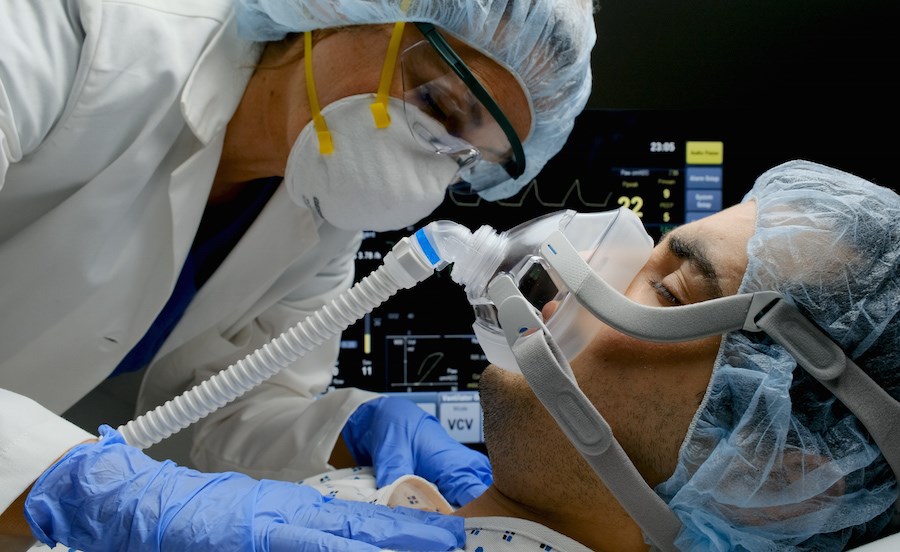New data show unvaccinated people are driving serious COVID-19 infections in B.C., despite that group comprising a small segment of the overall population.
Those suffering with the most severe COVID-19 infections in B.C. are occupying beds in hospitals' intensive care units (ICUs). The number of people in those wards rose by four over the past three days, to 139. Of those, 121, or 87%, are unvaccinated, whereas only about 14.2% of B.C.'s population that is eligible to be vaccinated is unvaccinated.
"Under the age of 50, there are 38 people in critical care with COVID-19," said B.C. Health Minister Adrian Dix. "Thirty-seven of them are unvaccinated."
The number of British Columbians in ICUs has risen in each of the past 12 data updates, and is now the highest that it has been since May 14.
Dix said the large number of unvaccinated people in ICU is placing a significant strain on B.C.'s health-care system. The province has 510 ICU beds, without counting 218 additional, so-called "surge" beds, which were put in place during the pandemic for emergencies.
"We're going to care for everybody who's sick. We are going to provide the best critical care in the world," Dix said.
"Our critical care team – tired, sometimes frustrated, sometimes exhausted, are providing the best possible care to all of the people in critical care, particularly those with COVID-19 right now. Their efforts, their understanding, their research, their practical experience means that they're going to provide you with extraordinary exceptional care but all of them would rather be doing something else."
COVID-19 infections serious enough for any kind of hospital care had been rising, but fell by three in the past three days, to 278.
Another nine people lost their lives to the disease in the past three days, raising B.C.'s pandemic death toll to 1,865.
New infections are being detected at a steady pace, with another 1,984 infections detected in the past three days. The province warned that this number is "provisional," and may be revised as new data arrives.
The new cases bring the province's total to 175,142 COVID-19 cases since the first case was detected in the province in late January, 2020.
Nearly 95.4%, or 167,078 of those infected in B.C., are deemed by the province to have recovered because they have gone 10 days after first feeling symptoms, and are therefore not thought to be infectious.
The total number of active infections fell by 25 in the past three days to 5,825.
Dix said that he was pleased with the uptake for the government's plan to implement a vaccine-card system, as 2,110,676 people had accessed their vaccine cards as of 10:30 a.m. Individuals who have their personal health number, birth date, and the date of one of their vaccine doses, are asked to sign into the vaccine card system so they can enter those details and get proof of their vaccination status, and a QR code.
Starting today, vaccine cards are required to enter social venues such as restaurants, bars and concerts. As of October 24, British Columbians' vaccine cards will need to show that they are fully dosed, or have gone seven days following their second vaccine jab in order to enter those venues. The initiative remains controversial for a small minority of the population, as a protest rally was held this afternoon outside Vancouver City Hall.
The government estimates that 85.8% of the eligible population, older than 12 years, has received at least one dose of vaccine, while 78.4% of that population has had two doses.
Vaccinations continue at a comparatively slow pace because so many British Columbians are already vaccinated. In the past three days, health officials administered 16,368 doses of vaccine to previously unvaccinated British Columbians. Another 18,044 jabs went to B.C. residents who needed second doses
Of the 3,978,624 B.C. residents who have received one dose of vaccine, more than 91.3%, or 3,632,547 are fully vaccinated.
The B.C. government estimated in July that the province's total population is 5,147,712, so Glacier Media's calculation is that 77.3% of B.C.'s total population has had at least one dose of vaccine, and nearly 70.6% of the province's total population has had two doses.
Other COVID-19 news includes that B.C. is making vaccination for COVID-19 a condition of employment for all healthcare workers. The approximately 15,000 British Columbians who are immunocompromised will also start being invited to receive third doses of vaccine as a way to top up their number of antibodies.
Glacier Media crunched the numbers for how many of the 1,984 cases identified in the past three days were in each of the province's health regions. The result for the number of new infections for each 10,000 residents (with total new cases in brackets) was:
• 3.4 in Fraser Health (609);
• 2.6 in Vancouver Coastal Health (319);
• 7.3 in Interior Health (542);
• 9.8 in Northern Health (294); and
• 2.6 in Island Health (220).
No new cases were in people who normally reside outside B.C.
The result by health region for the 5,825 people fighting active infections for each 10,000 residents (with total new cases in brackets) was:
• 9.5 in Fraser Health (1,711);
• 7.6 in Vancouver Coastal Health (945);
• 21.8 in Interior Health (1,618);
• 31 in Northern Health (931); and
• 7.1 in Island Health (607).
The active case counts include 13 people who normally live outside B.C.
Two new health-care facility outbreaks are at Kootenay Boundary Regional Hospital in Trail, and at Opal by Element in downtown Vancouver. There are a total of 24 health-care outbreaks.




